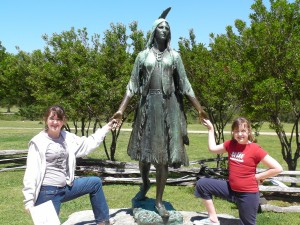August 23, 2011 at 7:39 am, by Carl
Back in the spring, I escorted my two youngest daughters, Meryn and Brynn, on a school trip to Colonial Williamsburg. If you know the region, it’s called the Historic Triangle because the battlefield of Yorktown and the first colony Jamestown are within a few miles of each other. We had been there back in 2006 for a family trip, driving through Williamsburg and spending time at Yorktown, but we didn’t get to Jamestown. So, the girls and I took a day to spend time at Jamestown.
While there, I discovered something that hadn’t really hit my radar before. The original settlers who came over in the spring of 1607 aboard the Susan Constant, with the two smaller ships, the Godspeed and Discovery, were all male. Not a single woman among them. I was amazed at that. Here you have a decision to attempt a colony, but not a single woman.
As I thought about it, the decision became more obvious. Over the previous 100 years, the French and the Spanish had been working to control the land of the New World through a series of colonies and groups. When I have my students study their colonies, I remind them that these two countries had a 100 year head start over the English, so by all rights, we should be speaking Spanish or French. Why aren’t we? Well, there are various reasons, but one main reason was how these two countries did their colonies. Upon study, what you find is that neither country really established any cities, there are few actual colonists—people coming over planning on staying forever. Instead, the French and the Spanish, and now the English here at Jamestown, were really looking to establish trading posts or forts from which they could try to exert influence around the area.
So, the English were doing nothing different than the other nations. Moreover, as we start to investigate the colonization by the English, I think one can begin to see some major themes that provide foundation for what eventually becomes the USA. Capitalism and Christianity are two of those major themes; the Plymouth colony was founded by Christians, and soon joined by other Christians like the Puritans. Jamestown, on the other hand, were founded by a business conglomerate, whose overriding passion was to make money—capitalism, profit, financial success. Imagine today, in 2011, the USA did decide to colonize the moon; perhaps some large rich church like Willow Creek in Chicago or Saddleback Church out in California would send a group (like the Pilgrims), and then imagine Microsoft or Ford or Coke sending a group to mine some mineral from the moon, to make money—that is Jamestown.
Well, it didn’t really work. First off, the English found out that unlike the Spanish, there was no easy gold to find, and unlike the French, they did not discover a wealth in furs. By September of 1608, the colony was in real trouble and over the next ten years, things remained in doubt. By 1610, the colony had lost about 80% of their settlers, but slowly but surely, more settlers arrived, including women.
Over those years, the Jamestown settlers finally figured out that their future lay with agriculture. That finding, however, meant that to survive, they had to break away from the French or Spanish model of a male-dominated society of fortune seekers. Instead, what was needed were families.
That’s right, families—male and females getting married, creating families and producing children. Perhaps that is a tough pill to swallow in 2011 as so many seem eager to sacrifice marriage and family for some other path that a few wish to trod. But, clearly, the success of the English colonies, and indeed the USA in total, stands on the back of the family.
The company that was in charge of the colony recognized this fact in 1619, so the order back in England came that “…a fit hundredth might be sent of women, maids young and uncorrupt, to make wives to the inhabitants and by that means to make the men there more settled and less movable….” They got 90 in 1620 and the future success of Virginia was never again in doubt. The Virginia company records reported in May of 1622 that, “57 young maids have been sent to make wives for the planters, divers of which were well married before the coming away of the ships.”
Not only does this fact speak volumes about the need for community, the real point is the defense of the family. Many today want to beg for alternatives, claiming that their efforts won’t really hurt the country. While I can understand a demand for fair practices relative to benefits from a company, the undeniable concept that we can take from Jamestown is that without families of men and women, the colony would have never survived. Or, perhaps like the Spanish, they would have been able to maintain an outpost, or like the French a trading center, but ultimately, the country that would win the race for the New World would be that country that actually planted permanent colonies.
Permanence would come when the colony could replicate its own numbers, and that happens through families. Oh sure, they could have decided to just let people have sex as they wished, and then had a ton of unwed mothers with random children wandering around, but the 1600s world understood much better than we do that children raised without both a father and a mother have a worse experience. Children raised that way experience a tougher time that children raised in a home with both parents.
We recently celebrated the 400th anniversary of the founding of Jamestown. Without the coming of women and the establishment of families, marriages to “the inhabitants” to help make the men “more settled,” that celebration probably would not have happened.















Leave a Reply
Inappropriate or irrelevant comments will be removed at an admin's discretion.